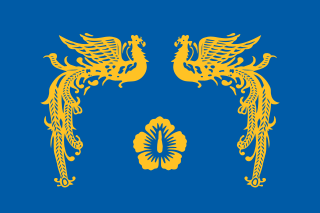These are lists of incumbents, including heads of states or of subnational entities.

A prime minister is the head of a cabinet and the leader of the ministers in the executive branch of government, often in a parliamentary or semi-presidential system. A prime minister is not the head of state of their respective nation nor a monarch, rather they are the head of government, serving typically under a monarch in a hybrid of aristocratic and democratic government forms or a president in a republican form of government.
The head of government is either the highest or second highest official in the executive branch of a sovereign state, a federated state, or a self-governing colony, who often presides over a cabinet, a group of ministers or secretaries who lead executive departments. "Head of government" is often differentiated from "head of state", as they may be separate positions, individuals, or roles depending on the country.
Premier is a title for the head of government in some countries, states and sub-national governments. A second in command to a premier is designated as a vice-premier or deputy premier.

The President of the Republic of Korea is the Head of State, the Head of Government, the Commander-in-chief of the Armed Forces, the Chairperson of the Cabinet, the Chief Executive of the Government and the Head of the Executive Branch.

The Prime Minister of the Republic of Korea is appointed by the President of South Korea, with the National Assembly's approval. The officeholder is not required to be a member of the National Assembly. The Prime Minister is not the head of government but rather serves in a role similar to that of a vice president.

The Premier of the Cabinet is nominally the non-executive head of government of North Korea. The office is also alternatively known as Prime Minister of North Korea. The current premier is Kim Jae-ryong.

The Executive and Legislative branches operate primarily at the national level, although various ministries in the executive branch also carry out local functions. Local governments are semi-autonomous and contain executive and legislative bodies of their own. The judicial branch operates at both the national and local levels. The South Korean government's structure is determined by the Constitution of the Republic of Korea. This document has been revised several times since its first promulgation in 1948. However, it has retained many broad characteristics; with the exception of the short-lived Second Republic of South Korea, the country has always had a presidential system with a relatively independent chief executive.

The China–Japan–South Korea trilateral summit is an annual summit held between China, Japan and South Korea, three major countries in East Asia. The first summit was held during December 2008 in Fukuoka, Japan. The talks are focused on maintaining strong trilateral relations, the regional economy and disaster relief.

The first lady of the Republic of Korea, commonly known as the first lady of South Korea, is the wife of the president of South Korea. The wife of the prime minister of South Korea is the second lady of South Korea.

The relationship between the Republic of Korea and the United Kingdom of Great Britain and Northern Ireland spans from the 19th century to the present day. Although the Republic of Korea gives 18 January 1949 as the date of the establishment of formal relations with the United Kingdom, diplomatic ties go back to 1883. British military participation in the Korean War during the 1950s was significant, but relations between the two countries at the time were described as "tenuous", with relatively little known about each other. Commercial and trade relationships grew rapidly during the 1970s. During the Asian Financial Crisis in the late 1990s, Queen Elizabeth II made a state visit to South Korea, which was well received at a time of crisis in the country. Today, there are strong economic and diplomatic links between the two countries.
Nam Duck-woo was the 12th Prime Minister of South Korea from 1980 to 1982.
Events from the year 2006 in South Korea.

Transparency International's 2016 Corruption Perception Index ranks the country 52nd place out of 176 countries.

The Deputy Prime Minister of South Korea is a senior member of the Cabinet of South Korea.

The 2019 G20 Osaka summit was the fourteenth meeting of the G20, a forum of 19 countries and the EU that together represent most of the world economy. It was held on 28–29 June 2019 at the International Exhibition Center in Osaka. It was the first G20 summit to be hosted by Japan.
This page is based on this
Wikipedia article Text is available under the
CC BY-SA 4.0 license; additional terms may apply.
Images, videos and audio are available under their respective licenses.
















